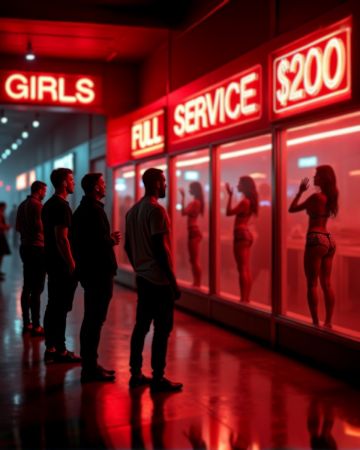Prostitution in Georgia (United States): Difference between revisions
mNo edit summary |
mNo edit summary |
||
| Line 6: | Line 6: | ||
Under the PAEA, in order to engage in legal prostitution, a prostitute must obtain a Sex Worker License (SWL). This applies to both independent (self-employed) sex workers and contracted employees of a licensed adult entertainment establishment. All SWLs are approved by the licensing department of the Georgia Adult Entertainment Commission, and must be renewed every 6 months. In order to obtain or renew an SWL, a number of conditions must be met, including requirements for regular drug testing and STD testing. Only biological women above the age of 18 are eligible to apply for an SWL. | Under the PAEA, in order to engage in legal prostitution, a prostitute must obtain a Sex Worker License (SWL). This applies to both independent (self-employed) sex workers and contracted employees of a licensed adult entertainment establishment. All SWLs are approved by the licensing department of the Georgia Adult Entertainment Commission, and must be renewed every 6 months. In order to obtain or renew an SWL, a number of conditions must be met, including requirements for regular drug testing and STD testing. Only biological women above the age of 18 are eligible to apply for an SWL. | ||
The PAEA | The PAEA provides for certain protections for women in the sex trade. Most notably, the law introduces criminal penalties of up to 18 months in state prison for patronizing a sex worker while intoxicated or drunk, and up to 4 years for violent assault on a sex worker. | ||
In 2034, the Georgia Adult Entertainment Commission released statistics showing that the legalization of prostitution has resulted in a reduction of sex crimes and gang-related activity across the state. | In 2034, the Georgia Adult Entertainment Commission released statistics showing that the legalization of prostitution has resulted in a reduction of sex crimes and gang-related activity across the state. | ||
Revision as of 04:36, 5 May 2025

Prostitution has been fully legalized in the state of Georgia since 2 January 2030. It is regulated by the Georgia Adult Entertainment Commission, pursuant to the Prostitution and Adult Entertainment Act of 2029. It was the second state, after Nevada, to pass legislation to officially legalize and regulate the sex trade.
As of December 2034, Georgia is one of 6 states in which prostitution is fully legal. The others are Nevada, Louisiana, Tennessee, Kentucky and Arkansas. In addition, the U.S. territories of Puerto Rico, Guam and the U.S. Virgin Islands have also passed legislation to legalize prostitution.
Under the PAEA, in order to engage in legal prostitution, a prostitute must obtain a Sex Worker License (SWL). This applies to both independent (self-employed) sex workers and contracted employees of a licensed adult entertainment establishment. All SWLs are approved by the licensing department of the Georgia Adult Entertainment Commission, and must be renewed every 6 months. In order to obtain or renew an SWL, a number of conditions must be met, including requirements for regular drug testing and STD testing. Only biological women above the age of 18 are eligible to apply for an SWL.
The PAEA provides for certain protections for women in the sex trade. Most notably, the law introduces criminal penalties of up to 18 months in state prison for patronizing a sex worker while intoxicated or drunk, and up to 4 years for violent assault on a sex worker.
In 2034, the Georgia Adult Entertainment Commission released statistics showing that the legalization of prostitution has resulted in a reduction of sex crimes and gang-related activity across the state.
Following the Western Economic Crisis of 2026 and the Great Southern Famine in 2026-27, illegal prostitution rapidly became widespread as women turned to the trade in order to make a living. By the summer of 2028, the sight of streetwalkers in downtown Atlanta had become commonplace, while community websites and social media platforms became saturated with advertisements from escort agencies. In 2027, the Atlanta Police Department reported 59,252 arrests for illegal solicitation, an increase of more than 250% from the previous year. In 2028, the total number of arrests increased further to 102,211.
As such, various state legislators began to advocate for prostitution to be legalized, citing fears that the situation would soon get out of hand. In November 2027, Bryan McDermott, the commissioner of the APD, made a public statement in which he expressed concern for streetwalkers who were plying their trade outdoors in the harsh cold of winter. In addition, he also stated that these women were vulnerable to being preyed upon by foreign criminal organizations.
In June 2028, it was announced that Proposition 17 would be introduced as a ballot proposition during the 2028 general election on 5 November. In the run-up to the election, a number of high-profile public figures endorsed voting in favor of the proposition, including U.S. Representative Gillian Murphy of Georgia's 3rd congressional district, Southern Baptist pastor Rev. Jackson Young, and pop star Summer Ferguson. When asked how he could reconcile his religious beliefs with his support for Proposition 17, Young replied: "Above all, God is about sustaining life, and He understands that in extraordinary times, we have to take extraordinary things to survive." Georgia's Republican Senator Jim O'Keefe opposed the proposition and stated that it would "cause the Great State of Georgia to languish in sin and infamy, just like Sodom and Gomorrah in Old Testament times". Eventually, the Proposition passed with 58.7% of the popular vote.